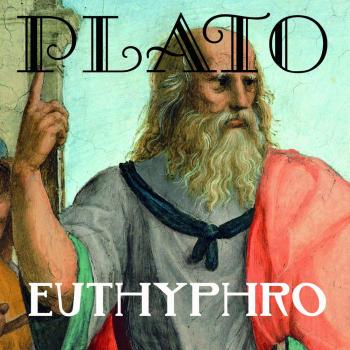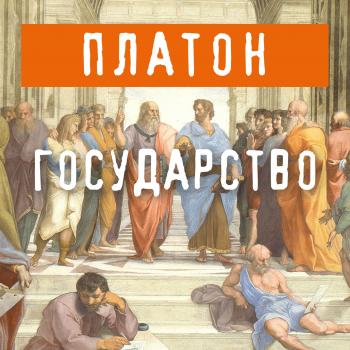Платон
Список книг автора ПлатонIon
In Plato's Ion (Greek: Ἴων) Socrates discusses with the titular character, a professional rhapsode who also lectures on Homer, the question of whether the rhapsode, a performer of poetry, gives his performance on account of his skill and knowledge or by virtue of divine possession. It is one of the shortest of Plato's dialogues. Famous dialogues of Plato – Early: Apology, Charmides, Crito, Ion, Euthyphro, Hippias MinorIon, Laches, Lysis; Transitional and middle: Cratylus, Euthydemus, Gorgias, Menexenus, Meno, Phaedo, Protagoras, Symposium; Later middle: Parmenides, Phaedrus, Republic, Theaetetus; Late: Critias, Laws, Philebus, Sophist, Statesman, Timaeus.
Euthyphro
Euthyphro (Ancient Greek: Εὐθύφρων, romanized: Euthyphrōn; c. 399–395 BC), by Plato, is a Socratic dialogue whose events occur in the weeks before the trial of Socrates (399 BC), between Socrates and Euthyphro. The dialogue covers subjects such as the meaning of piety and justice. The Euthyphro dialogue occurs near the court of the archon basileus (king magistrate), where Socrates and Euthyphro encounter each other; each man is present at the court for the preliminary hearings to possible trials. Euthyphro has come to present charges of murder against his own father who, after arresting one of his workers for killing a slave from the family estate on Naxos Island, tied him and threw him in a ditch where he died of exposure to the elements without proper care and attention while Euthyphro's father awaited to hear from the exegetes about how to proceed. Socrates is astonished by Euthyphro's confidence in being able to prosecute his own father for the serious charge of manslaughter, despite the fact that Athenian Law allows only relatives of the dead man to file suit for murder. Euthyphro dismisses the astonishment of Socrates, which confirms his overconfidence in his own critical judgment of matters religious and ethical. The dialogues of Plato – Early, Transitional and middle, Later middle, Phaedo, Later middle, Late, Of doubtful authenticity.
Crito
Crito (Ancient Greek: Κρίτων [krítɔːn]) is a dialogue by the ancient Greek philosopher Plato. It depicts a conversation between Socrates and his wealthy friend Crito regarding justice (δικαιοσύνη), injustice (ἀδικία), and the appropriate response to injustice. Socrates thinks that injustice may not be answered with injustice, and refuses Crito's offer to finance his escape from prison. The dialogue contains an ancient statement of the social contract theory of government. In contemporary discussions, debate over the meaning of Crito attempt to determine whether it is a plea for unconditional obedience to the laws of a society. The conversation, which may be based on a true historical event, was published in 399 BC. Since his trial in Apology, Socrates has been imprisoned for four weeks, with his execution coming in a matter of days. Historians are not aware of the exact location of Socrates' cell, but according to excavations, it is about 100 meters southwest of the Heliaia court, just outside the site of the agora. Other than Socrates, Crito is the only other character in the story. Crito himself is a rich Athenian, who like Socrates is from Demos Alopeke. Once charged with corrupting the youth and atheism, Crito unsuccessfully vouched to pay Socrates' bail. Additionally, after Socrates was sentenced to death, Crito was ready to pledge to the court that Socrates would not flee in order to spare him the prison sentence. This plea was ultimately rejected. Through both the trial and the execution, Crito was present. In other dialogues, Crito is a conventional Athenian, who cannot understand Socrates' philosophy, despite his attempts to do so. The dialogues of Plato – Early, Transitional and middle, Later middle, Phaedo, Later middle, Late, Of doubtful authenticity.
Платон. Диалоги
Наследие Платона дошло до наших дней не отрывками или цитатами, а почти целиком. «Диалоги» Платона удивляют простым изложением и одновременно глубиной мысли. А далогичная форма повествования, наблюдение за разговором как бы со стороны значительно улучшают понимание текста. В это произведение включены избранные диалоги Платона, представляющие наибольший интерес. Среди них «Апология Сократа», «Критон», «Федон», «Федр», «Софист» и «Пир».
Федр
"Нам следует уяснить причину утраты крыльев и почему они отпадают от души” Согласно рукописной традиции, диалог “Федр” имеет два варианта подзаголовка: “о прекрасном” или “об эросе”. В рукописях указывается и жанр сочинения: этический диалог. Хотя все эти уточнения принадлежат не автору, а являются позднейшими вставками, цель написания “Федра” всегда интересовала его читателей и стала камнем преткновения для специалистов. Диалог «Федр» – одно из самых противоречивых произведений Платона, породившее длинный шлейф толкований, самые ранние из которых возникли еще в Античности. В качестве предмета диалога называли: любовь, риторическое искусство, душевное начало и даже многообразие прекрасного в целом. Поэтическая образность «Федра» заставляет пересмотреть сложившиеся представления о творчестве великого грека, а логические парадоксы этого текста бросают вызов современным философским и литературоведческим теориям. Перевод Для любой развитой научной традиции является нормой регулярное обращение к классическим текстам с целью пересмотра имеющихся переводов и трактовок. Изменение научного горизонта, научного языка, накопление новых данных, появление новых трактовок историко-философских доктрин, которые казались школьными и незыблемыми, приобрело в последние десятилетия кумулятивный характер. Все это накладывает свой отпечаток и на переводческую деятельность: переводы не просто уточняют какие-то детали или недочеты. Они готовятся на основе иных методологических позиций и учитывают – в меру сил – имеющийся зарубежный опыт исследования платоновского корпуса (там появление очередных переводов классических текстов каждые 20-25 лет является нормой). Настоящий перевод подготовлен в рамках деятельности Платоновского философского общества. Издательство: Студия озвучания «Глагол», 2019 г. Перевод: Алексей Анатольевич Глухов Чтец: Дмитрий Оргин Корректор: Любовь Германовна Каретникова Обложка: Анна Колесниченко
Государство
Платон – родоначальник европейской философии. Каждый кто собирается читать его диалоги, знает: из них вырос и загадочный неоплатонизм, и средневековая схоластика, и классическая философия. Зачастую древних авторов перестают читать, предполагая, что это потребует особой подготовки, однако диалоги Платона ошеломляют своей неожиданной простотой. «Государство» посвящено проблемам устройства идеального государства, основанного на высшей справедливости. В нем также содержится критический анализ шести форм государства, размещенных автором последовательно – от наилучшего к худшему: монархия, аристократия, тимократия, олигархия, демократия и тирания. В оформлении использована картина: Рафаэль Санти «Афинская школа», 1511.









